- Home
- F. Paul Wilson
Infernal Page 13
Infernal Read online
Page 13
“Do you? And who shall I say is calling?”
“Your navigator.”
The smirk turned into a grin. “You are on the wrong ship, sefior. Sergio Vazquez is our navigator.” He shrugged. “Of course he has been ill—”
“Senor Vazquez died in his sleep in Compano last night. I have been sent by the ship’s owner to replace him.”
Now the smirk disappeared. “Vazquez… dead?”
Nearby, two seamen paused in their labors and looked up, echoing Eusebio.
Francisco feigned losing patience. “The captain?”
“He is ashore but he will be back soon. You can wait outside his cabin.”
He followed Eusebio up the steps to the aftcastle.
“Here,” Eusebio said, pointing to a spot in front of the door to the officers’ quarters. Then he wagged his finger. “Not inside.”
“Very well.”
“As soon as he gets back I will tell him you are here.”
Francisco nodded and placed his belongings on the deck: a cloth sack with his clothes and personal items, a mahogany box containing his astrolabe—which he would not need until they were out of sight of the coast—and his oilcloth-wrapped portolano.
He gazed out over the main deck, bustling in the dawn. Three masts, naked now, but soon to be rigged square and lateen. But what lay belowdecks interested him more: a secret nestled among the cargo bound for the New World.
It was that secret that had brought him here.
It had to do, in a way, with King Philip, old and sick and not long for this world. Perhaps it was the humiliation of three failed attempts to invade England, the most recent just last year when the third Armada was turned back by heavy seas. Philip ruled the most powerful nation in the world, yet his heavy taxation threatened Spanish hegemony; he would be leaving his successor an empire in crisis.
Perhaps Spain’s day had passed. The thought saddened Francisco. He had sailed in her navy as a younger man, and had piloted the Santa Clarita in the first Armada. Could it have been only a decade ago? It seemed like a lifetime.
His small galleon, the Santa Clarita, had escaped Drake’s fireboats but had been driven north with the rest of the fleet. Francisco had guided the ship through the stormy Orkney isles north of Scotland and back to Lisbon. His ship was one of only sixty-seven out of the one hundred and thirty of the original fleet.
Despite his failings, Philip remained favored by the Vatican as a loyal member of the Catholic League in the wars against the Huguenots, and as a staunch defender of the faith against the rising Calvinist threat.
This was why the Church was maintaining the utmost discretion as it dealt with the theft of a valuable relic from its proscribed vault deep below the Vatican. The cardinals still did not know how the thief had eluded detection by the Swiss Guard and gained access to the vault, but there was no doubt about his identity: Don Carlos of Navarre, King Philip’s beloved nephew.
Six weeks ago his Holiness Pope Clement VIII had summoned Father Claude Aquaviva to the Holy See. There, behind the locked doors of the innermost sanctum of the Vatican, the Father General of the Society was charged with the retrieval and disposal of the purloined relic, with no harm to Don Carlos in the process, and no connection to the Vatican. In fact, if the object’s loss appeared to be an act of God rather than man, so much the better.
Francisco found it astounding that an honor of this magnitude would be bestowed upon such a young order. A former soldier named Ignatius Loyola had founded the Society of Jesus fewer than six decades ago, but since its inception it had proved a magnet for some of the best minds in the civilized world.
That Francisco, a yet-to-be-ordained Jesuit brother, should be chosen for the mission… well, it seemed beyond belief.
Could it be but three weeks since Father Diego Vega, the Father General’s second in command, had stepped into his quarters, closed the door, and told him what he must do?
Francisco understood that he had been chosen because of his nautical past and his interest in astronomy. And of course, because of his devotion to the Society.
His head was still spinning. He had spent the last three years in Greece studying their ancient texts on the stars, and had only recently returned. He was still recovering from the disorienting experience of seeming to lose ten days of his life because of Greece’s refusal to give up the Julian calendar. Spain had been utilizing Pope Gregory’s new calendar for decades.
And now this.
The world was changing too fast. Ah, but the stars… one could always count on the stars.
He had joined the King’s Navy at a young age and learned navigation by trial and error. Before too long he was assisting the pilot, honing his skills as he sailed the length and breadth of the Mediterranean, staying mostly within sight of shore as did most navigators, but unafraid to leave the comfort of land on the horizon and strike out into open water.
Not a terrible risk in the Mediterranean. If one set sail from its African shore and held to a northerly course, soon enough one would spy Europe.
But the Atlantic… now that was a different matter. The swells, the storms, the space between its shores. Not a place for the faint of heart.
Francisco remembered the first time he had piloted a galleon through the Straits of Gibraltar and into the Atlantic. The captain had wanted to test the seaworthiness of his vessel as well as Francisco’s skills. They traveled west-northwest for two days, then south for one, and then the captain told him to guide them back to where they had begun.
Using his astrolabe and cross staff, Francisco piloted the ship with such accuracy that their first sight of land was the high cliffs of Gibraltar.
He would have had a future in the navy, but instead he obeyed a higher calling.
He looked now again at the main deck of the Sombra. Originally christened Santa Ines, it had served Spain until last year when the navy sold it. Francisco was no expert on naval policy, but he wondered how often a navy sold off one of its ships. Another sign of an atrophying empire? He might understand if the Santa Ines was old and decommissioned, but this nao was in excellent condition.
Even considering King Philip’s financial troubles, selling it seemed unusual. So unusual that one would have to assume the buyer to be a most influential man. Like Don Carlos of Navarre, perhaps.
But why had the new owner changed the ship’s name from something holy to something unquestionably dark—from a saint to a shadow? Why would anyone choose such a name for a ship?
And why would it be sailing without escort through waters infested with pirates and British privateers?
He had to wonder as to its intended purpose.
He saw a heavyset man in a white ruffled shirt and black waistcoat step aboard. He watched Eusebio make an obsequious approach and point toward him.
Francisco gave a slight bow as the man reached the aftcastle.
“Captain Gutierrez, I presume?”
He looked irritated. “Yes-yes. What is this about Vazquez? Is he really dead?”
“Quite.”
“Who sent you, then?”
“Apparently the owner of Sombra and I share an acquaintance whose craft I have piloted on numerous occasions. He recommended me and I accepted the assignment.”
A flagrant lie, and if the captain had the time to check with the owner’s agent, he would expose the untruth. But Francisco knew the captain had already been delayed by Vazquez’s illness. He had to put to sea today if he wanted to reach Cartagena anywhere near his expected time of arrival.
He shook his head. “Crossing the Atlantic with an unproved navigator…”
“Hardly unproved, sir. I learned my craft in His Majesty’s navy. Where, I assume, you learned yours.”
Captain Gutierrez quizzed him on the ships he had piloted, the captains he had served under. He too had been in the first Armada and was most impressed by Francisco’s bringing the Santa Clarita safely back to port.
That satisfied him.
“Very well
. We sail with the tide. You will have Vazquez’s cot in the officers’ quarters.”
As the captain brushed past him, Francisco allowed himself a deep breath of relief.
He had succeeded. He was now Sombra’s navigator.
He hoped God would forgive him for what he had done to poor Vazquez, and for what he would eventually do to this crew. Father Diego had said he would receive a Plenary Indulgence from His Holiness himself after completing this mission.
Opus Dei… Francisco had to keep reminding himself that he was doing the Lord’s work. He was removing an evil from the world, hiding it where no one would ever find it, where no one could ever steal it again.
He knew the name of the object hidden in the hold, but did not understand the nature of its evil—Father Diego had been coy on that. All he knew was that he must prevent it from reaching the New World.
* * *
SUNDAY
1
Jack stood on the dock and stared at Tom’s boat. Most of the surrounding slips in this marina in Nowhere, North Carolina, were empty. But even if they’d been crammed, Tom’s forty-footer, with its flag-blue hull, white superstructure, and varnished teak trim, would have stood out.
“What’s wrong?” Tom said as he carried his backpack and one of the food coolers past Jack.
“I didn’t know judges made this sort of money.”
“We don’t.”
Jack watched him step onto a rubber footplate on the gunwale and hop onto the rear deck.
“Then how…?”
“It’s not really mine. But the owner owes me a few favors, so I get to use it pretty much whenever I want.”
Jack shook his head in wonder.
It had been one long, strange car ride. Four-hundred-plus miles covered in eight-plus hours to these private docks on Wanchese harbor. Most of the time—when Tom wasn’t pumping him for details about his lifestyle—they’d played blues. Tom had asked him if he was the Jack mentioned in Bighead’s “R-J Blues.” Jack had told him he’d have to ask the singer.
“No kidding? This thing’s got to be worth a million or more.”
Tom shrugged. “Maybe. It’s a Hinkley T-forty but it’s got some years on it.”
“Who’s the owner?”
“Someone you never heard of.”
“Try me.”
“Okay. Name’s Chiram Abijah.”
“You’re right. Never heard of him. What’s he do?”
“This and that.”
Jack watched his brother’s expression as he asked, “Just what kind of favors did you do for What’s-his-name?”
“The kind that have me sneaking off to Bermuda.”
“Such as?”
“I helped get him off the hook a few times. But he’s now under federal indictment for money laundering. Can’t help him with that. The good thing is the feds don’t know about the boat, otherwise they would’ve RICO’d it along with his other stuff.”
Jack hung back on the dock, still holding the other cooler and staring at the craft.
Tom spread his arms. “Kevlar hull, teak deck, and wait till you see the pilot house—everything teak, cherry, and tulipwood.”
Jack backed up a step and squinted in the fading light at the large, gold-leaf script across the transom.
“Sahbon.… what’s that mean?”
“Means ‘soap’ in Hebrew. Get it? He used the boat to launder money, so he named it Soap. Pretty funny.”
“A riot. He’ll be the Robin Williams of Leavenworth.”
Jack stepped aboard and put his cooler in the cockpit near the helm. He stared at all the dials and screens and readouts.
“Looks like a 747 cockpit. Not that I’ve ever been in one, but…”
“State of the art,” Tom said. He looked like such a proud papa, Jack wondered if the boat might really be his. “Every telltale and navigation device you can imagine, and each backed up with another just like it. The previous owner is a very careful man.”
But not quite careful enough, Jack thought. Otherwise he wouldn’t be facing a vacation in a federal pen.
Jack nodded appreciatively. “Lots of navigation gizmos. Good. I like that. Wouldn’t want to miss Bermuda and wind up in Africa.”
Tom laughed. “This is the age of GPS, my boy. In case you don’t know, that stands for Global Positioning—”
“—System. I know. So this stuff works like one of those car navigators?”
“Even better. Soon as we clear the inlet, we plug in the latitude and longitude of Bermuda’s Great Sound and then we just sit back, crack a few beers, and relax.”
“Just how far is Bermuda?”
“About six hundred fifty miles due east.”
The figure jolted Jack.
“Six hundred—Jesus! How many miles a gallon does this thing get?”
“Maybe one.”
“One? That means we need—”
“Lots of gallons. Seven hundred to be safe.”
Jack looked around. “But where…?”
“Don’t worry. We’ve got plenty. Good old Chiram more than doubled Sahbon’s range by sticking extra tanks everywhere—under the bunks, under the dinette, in every available open space, all with a state-of-the-art manifold system to feed it to the engines. We’ll be riding low and slow at first, but we’ll do better as the tanks empty.”
“What about storms?”
“We’re past hurricane season and the seven-day forecast is clear and calm all the way.”
“And you say you’ve done this before?”
“Loads of times. Piece of cake. With this kind of equipment the boat literally drives itself.”
“Awful long way to go in a little boat.”
Tom bristled. “First off, it’s not ‘little.’ And second, if you think Bermuda’s far for the Sahbon, consider this: Every year people race to Bermuda in sailboats from places like Halifax and Newport.”
Another shock. “Sailboats?”
“Sailboats.”
“Why?”
“Because.”
Jack shrugged. “Good a reason as any, I guess.” He locked his gaze on his brother. “You’re sure you know what you’re doing?”
“Of course. Why do you keep asking me?”
“Because I’m leaving there”—he double-jerked his thumb over his shoulder at land—”and heading there”—he pointed to the water—”so I’d like to be—”
Tom snapped his fingers. “Yul Brynner, The Magnificent Seven. Right?”
Jack experienced a few seconds of disorientation, then realized what Tom was talking about. One of the few neutral topics of discussion on the drive down had been movies. Tom seemed to love them as much as Jack.
“Yeah, right,” he said. “Talking to the traveling salesman. Good pickup.”
Jack was impressed. Might have been more impressed if he weren’t facing the prospect of six-hundred-plus miles across open sea on a ship belonging to an indicted money launderer.
I’ll soon be in the middle of the goddamn Atlantic Ocean, in the dark, heading for the Bermuda Triangle, with Tom as my skipper. Now there was a comforting thought. At least the boat wasn’t named The Minnow.
* * *
2
Jack sat on a deck chair and kept his back to the coastline—so he wouldn’t have to see the lights disappear—while Tom manned the helm. Ahead, only water… a limitless expanse of black, gently rolling waves.
It had been full dark by the time they’d chugged away from the docks, heading south into Pimlico Sound. After maybe eight or nine miles—or should he start thinking in leagues now?—they’d passed under a highway arching over a gap called the Oregon Inlet, and then they were out to sea.
Am I having fun yet? Jack thought. Answer: no.
The breeze felt cool but Jack was comfortable in his jeans, flannel shirt, and hoodie. Crying seagulls swooped and glided between the boat and the starlit sky.
Half of Jack had wanted to wait for tomorrow and get a fresh start first thing in the morning;
the idea of cruising through the dark sent ripples through his gut, but there was no way around it: They were going to have to spend a night or two at sea no matter what time they left.
The other half wanted to get this whole deal over with, reminding him that the sooner they got going, the sooner they’d be back.

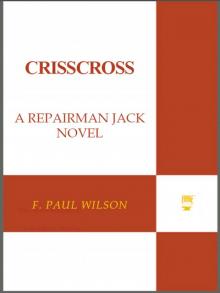 Crisscross
Crisscross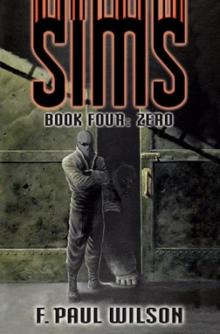 Ground Zero
Ground Zero Short Stories
Short Stories The Select
The Select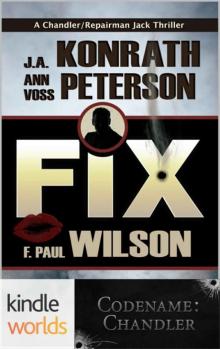 Codename
Codename Bloodline
Bloodline A Soft Barren Aftershock
A Soft Barren Aftershock The Tomb
The Tomb The Complete LaNague
The Complete LaNague The Tery
The Tery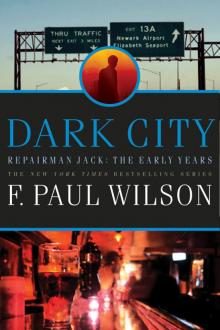 Dark City
Dark City Deep as the Marrow
Deep as the Marrow The Fifth Harmonic
The Fifth Harmonic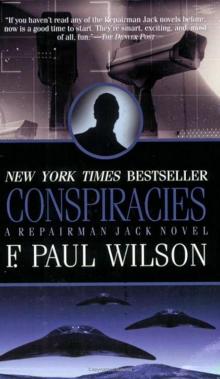 Conspiracies
Conspiracies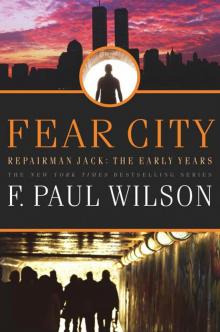 Fear City
Fear City Wheels Within Wheels
Wheels Within Wheels Wayward Pines
Wayward Pines The Portero Method
The Portero Method All the Rage
All the Rage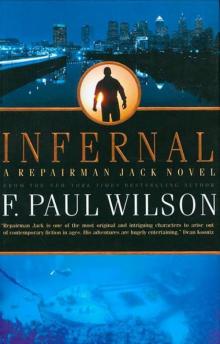 Infernal
Infernal The Barrens & Others
The Barrens & Others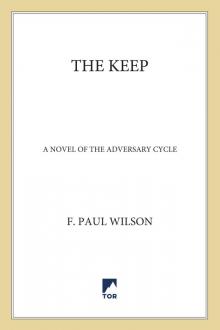 The Keep
The Keep Quick Fixes: Tales of Repairman Jack
Quick Fixes: Tales of Repairman Jack Virgin
Virgin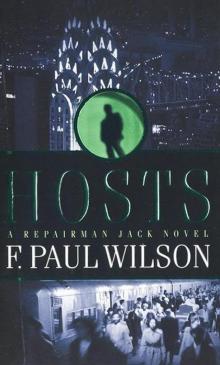 Hosts
Hosts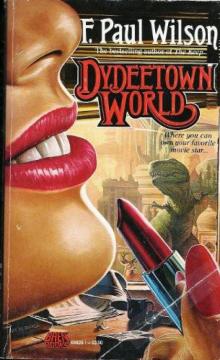 Dydeetown World
Dydeetown World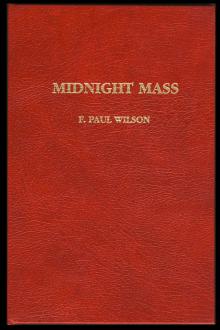 Midnight Mass
Midnight Mass Black Wind
Black Wind The Christmas Thingy
The Christmas Thingy The Last Rakosh
The Last Rakosh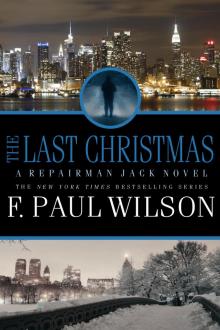 The Last Christmas: A Repairman Jack Novel
The Last Christmas: A Repairman Jack Novel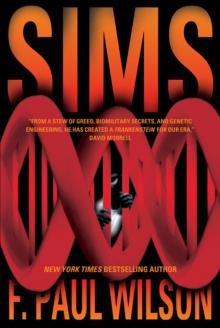 SIMS
SIMS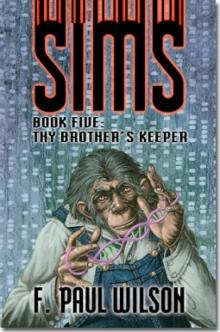 Thy Brother's Keeper
Thy Brother's Keeper Panacea
Panacea The Touch
The Touch Scenes from the Secret History
Scenes from the Secret History Scenes From the Secret History (The Secret History of the World)
Scenes From the Secret History (The Secret History of the World)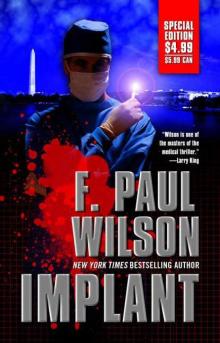 Implant
Implant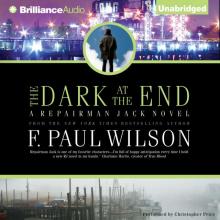 The Dark at the End
The Dark at the End Fatal Error
Fatal Error Wardenclyffe
Wardenclyffe Sibs
Sibs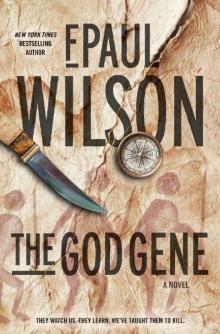 The God Gene
The God Gene The Void Protocol
The Void Protocol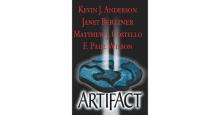 Artifact
Artifact The Compendium of Srem
The Compendium of Srem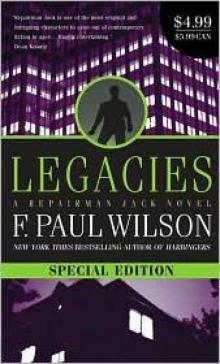 Legacies
Legacies Reprisal
Reprisal Jack: Secret Vengeance
Jack: Secret Vengeance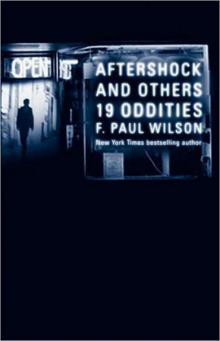 Aftershock & Others: 19 Oddities
Aftershock & Others: 19 Oddities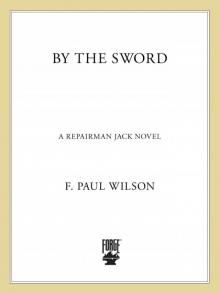 By the Sword
By the Sword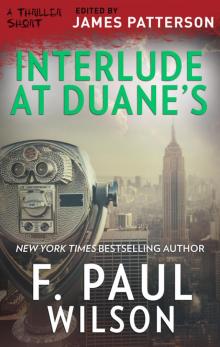 Interlude at Duane's (Thriller: Stories to Keep You Up All Night)
Interlude at Duane's (Thriller: Stories to Keep You Up All Night) Fatal Error rj-13
Fatal Error rj-13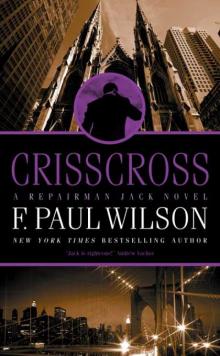 Crisscross rj-8
Crisscross rj-8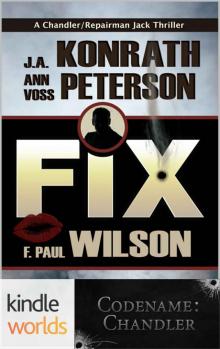 Codename: Chandler: Fix (Kindle Worlds Novella)
Codename: Chandler: Fix (Kindle Worlds Novella)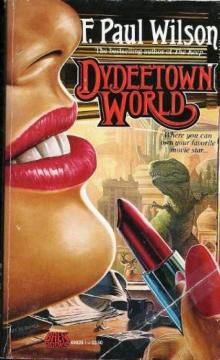 Dydeetown World lf-4
Dydeetown World lf-4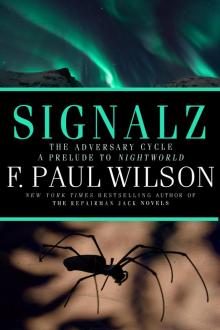 Signalz
Signalz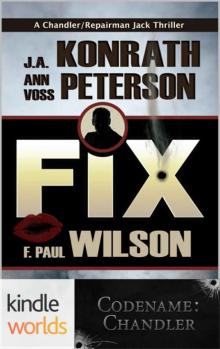 Codename_Chandler_Fix
Codename_Chandler_Fix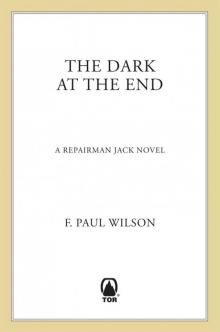 The Dark at the End (Repairman Jack)
The Dark at the End (Repairman Jack) The Complete Adversary Cycle: The Keep, the Tomb, the Touch, Reborn, Reprisal, Nightworld (Adversary Cycle/Repairman Jack)
The Complete Adversary Cycle: The Keep, the Tomb, the Touch, Reborn, Reprisal, Nightworld (Adversary Cycle/Repairman Jack)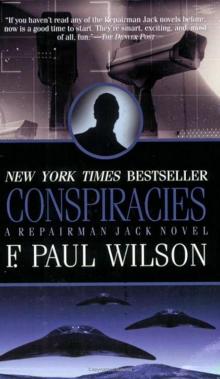 Repairman Jack 03 - Conspiracies
Repairman Jack 03 - Conspiracies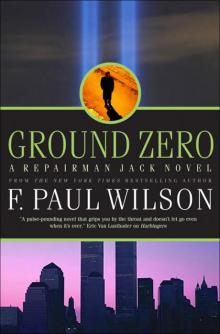 Ground Zero rj-13
Ground Zero rj-13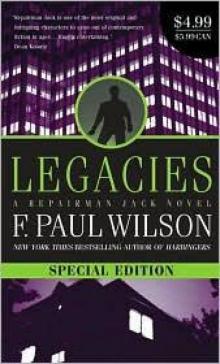 Repairman Jack 02 - Legacies
Repairman Jack 02 - Legacies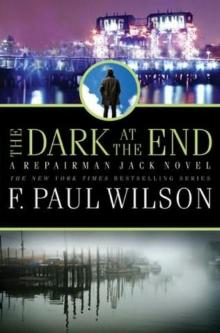 The Dark at the End rj-15
The Dark at the End rj-15![Repairman Jack [02]-Legacies Read online](http://i1.bookreadfree.com/i/03/21/repairman_jack_02-legacies_preview.jpg) Repairman Jack [02]-Legacies
Repairman Jack [02]-Legacies Double Threat
Double Threat The Tery lf-5
The Tery lf-5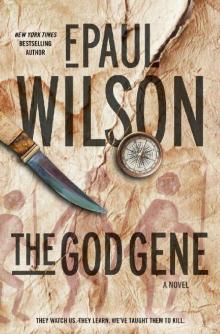 The God Gene: A Novel
The God Gene: A Novel Wayward Pines: The Widow Lindley (Kindle Worlds Novella)
Wayward Pines: The Widow Lindley (Kindle Worlds Novella)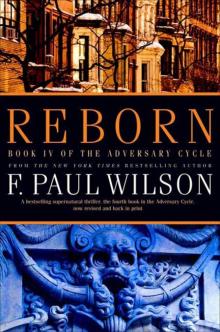 Reborn ac-4
Reborn ac-4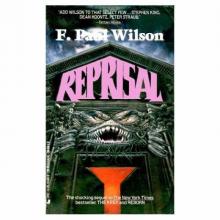 Reprisal ac-5
Reprisal ac-5 New Title 1
New Title 1 Healer lf-3
Healer lf-3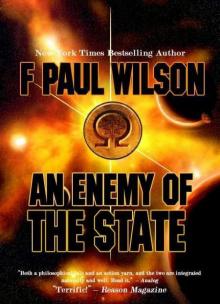 An Enemy of the State lf-1
An Enemy of the State lf-1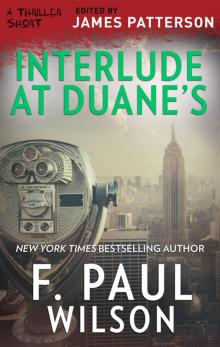 Interlude at Duane's
Interlude at Duane's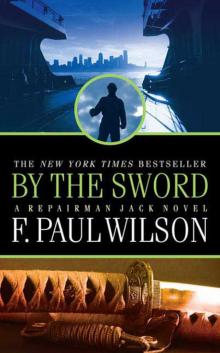 By the Sword rj-12
By the Sword rj-12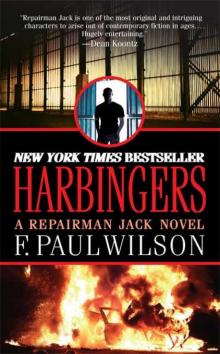 Hardbingers rj-10
Hardbingers rj-10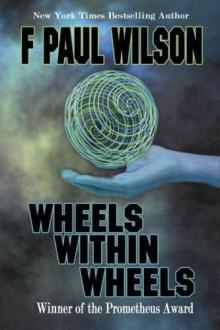 Wheels Within Wheels lf-2
Wheels Within Wheels lf-2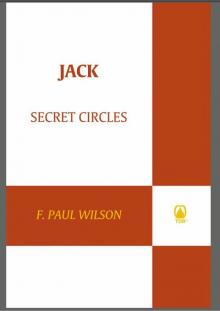 Jack: Secret Circles
Jack: Secret Circles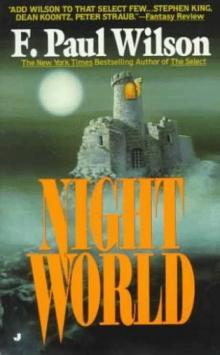 Nightworld ac-6
Nightworld ac-6 Quick Fixes - tales of Repairman Jack
Quick Fixes - tales of Repairman Jack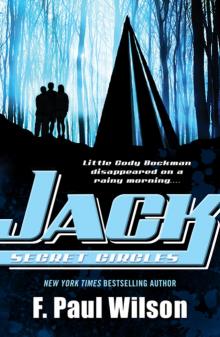 Secret Circles yrj-2
Secret Circles yrj-2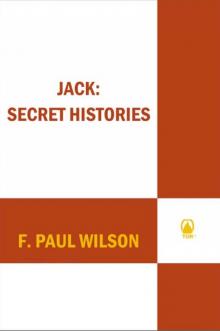 Jack: Secret Histories
Jack: Secret Histories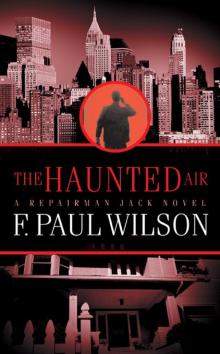 Haunted Air rj-6
Haunted Air rj-6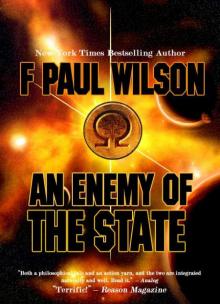 An Enemy of the State - a novel of the LaNague Federation (The LaNague Federation Series)
An Enemy of the State - a novel of the LaNague Federation (The LaNague Federation Series)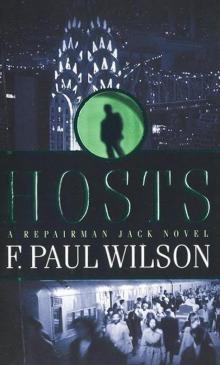 Repairman Jack 05 - Hosts
Repairman Jack 05 - Hosts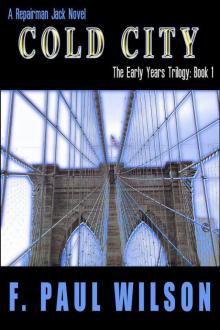 Cold City (Repairman Jack - the Early Years Trilogy)
Cold City (Repairman Jack - the Early Years Trilogy) The Peabody-Ozymandias Traveling Circus & Oddity Emporium
The Peabody-Ozymandias Traveling Circus & Oddity Emporium Uncommon Assassins
Uncommon Assassins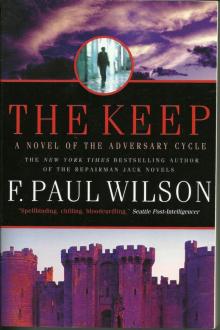 Adversary Cycle 01 - The Keep
Adversary Cycle 01 - The Keep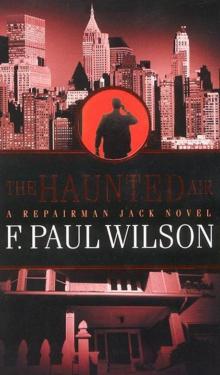 Repairman Jack 06 - The Haunted Air
Repairman Jack 06 - The Haunted Air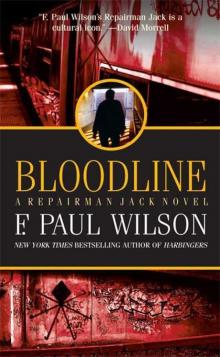 Bloodline rj-11
Bloodline rj-11 Ultimate Supernatural Horror Box Set
Ultimate Supernatural Horror Box Set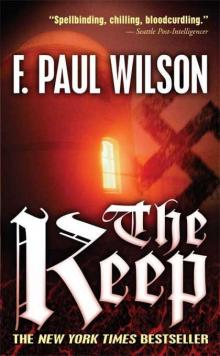 The Keep ac-1
The Keep ac-1 Repairman Jack 04 - All the Rage
Repairman Jack 04 - All the Rage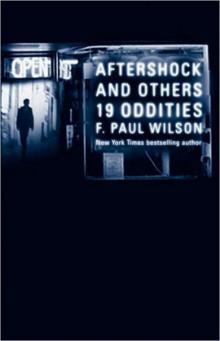 Aftershock & Others
Aftershock & Others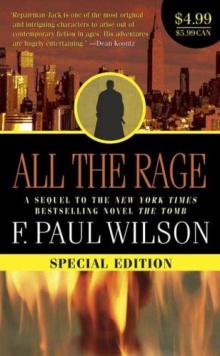 All the Rage rj-4
All the Rage rj-4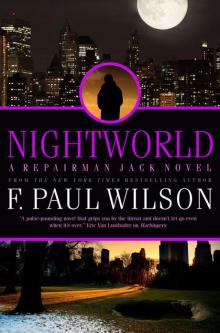 Nightworld (Adversary Cycle/Repairman Jack)
Nightworld (Adversary Cycle/Repairman Jack)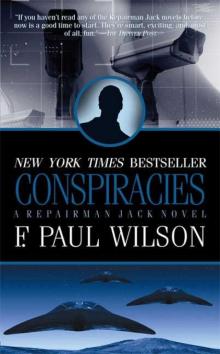 Conspircaies rj-3
Conspircaies rj-3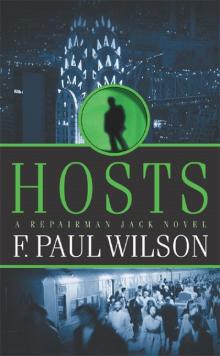 Hosts rj-5
Hosts rj-5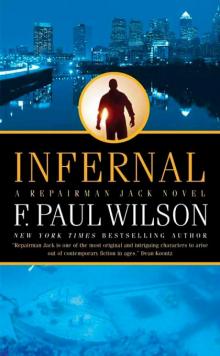 Infernal rj-9
Infernal rj-9 The God Gene: A Novel (The ICE Sequence)
The God Gene: A Novel (The ICE Sequence)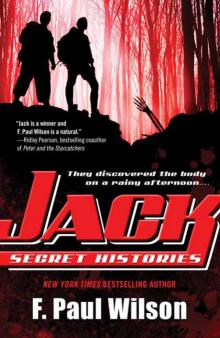 Secret Histories yrj-1
Secret Histories yrj-1